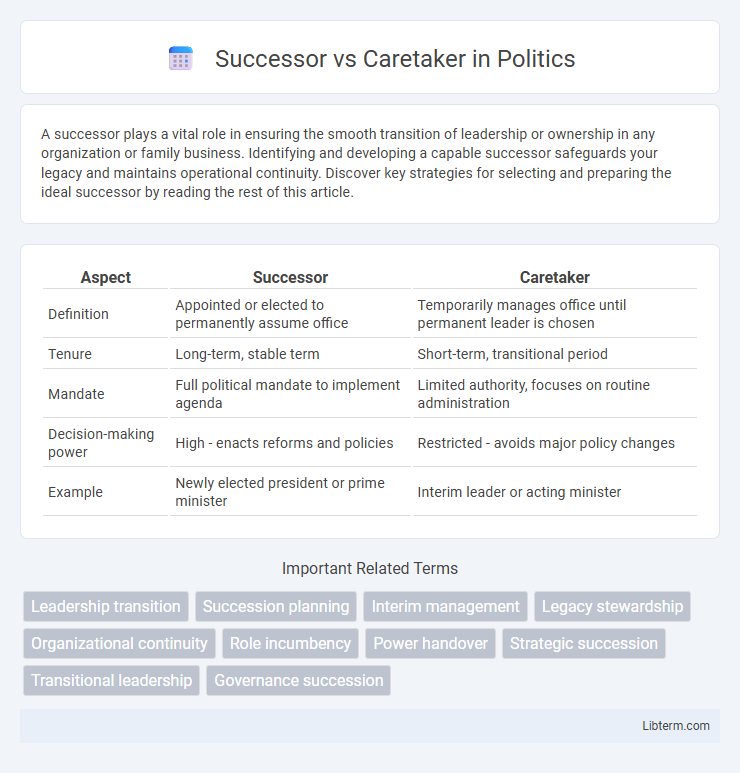A successor plays a vital role in ensuring the smooth transition of leadership or ownership in any organization or family business. Identifying and developing a capable successor safeguards your legacy and maintains operational continuity. Discover key strategies for selecting and preparing the ideal successor by reading the rest of this article.
Table of Comparison
| Aspect | Successor | Caretaker |
|---|---|---|
| Definition | Appointed or elected to permanently assume office | Temporarily manages office until permanent leader is chosen |
| Tenure | Long-term, stable term | Short-term, transitional period |
| Mandate | Full political mandate to implement agenda | Limited authority, focuses on routine administration |
| Decision-making power | High - enacts reforms and policies | Restricted - avoids major policy changes |
| Example | Newly elected president or prime minister | Interim leader or acting minister |
Understanding the Roles: Successor vs Caretaker
A successor is an individual appointed to assume full leadership and responsibilities permanently, ensuring continued growth and long-term vision execution. In contrast, a caretaker temporarily manages operations, maintaining stability without implementing major changes during transitional periods. Understanding these roles clarifies organizational dynamics and strategic planning for leadership succession.
Key Differences Between Successor and Caretaker
Successors are individuals appointed to permanently assume leadership or ownership roles, while caretakers temporarily manage responsibilities until a permanent replacement is found. Successors typically have formal authority and long-term goals, whereas caretakers maintain the status quo without initiating major changes. The key difference lies in the scope and duration of their roles, with successors driving strategic direction and caretakers ensuring continuity.
Responsibilities of a Successor
A successor assumes full responsibility for strategic decision-making, long-term planning, and maintaining organizational continuity during leadership transitions. They oversee the implementation of company policies, drive growth initiatives, and align resources to sustain competitive advantage. Unlike a caretaker, a successor actively shapes the vision and culture to ensure the enterprise's future success.
Duties of a Caretaker
A caretaker's duties primarily involve managing daily operations and maintaining stability during transitional periods. They oversee routine administrative tasks, ensure continuity of services, and address urgent issues without implementing long-term strategic changes. The caretaker focuses on preserving organizational integrity until a successor is appointed to resume full leadership responsibilities.
When to Choose a Successor
Choose a successor when long-term strategic vision, stability, and preserving organizational culture are critical for future growth and continuity. Successors often bring in fresh leadership while maintaining core values, making them ideal for family businesses, startups, or companies undergoing significant transformation. Selecting a successor ensures sustained innovation, gradual transition, and aligned decision-making with the company's mission and goals.
When to Appoint a Caretaker
Appoint a caretaker when the designated successor is unavailable, incapacitated, or when the transition period requires temporary oversight to maintain operational continuity. A caretaker manages day-to-day responsibilities without making long-term strategic decisions, ensuring stability during uncertain times. This role is crucial in organizations facing sudden leadership vacuums or when the successor needs preparation before assuming full authority.
Impact on Organizational Continuity
A successor ensures organizational continuity by implementing long-term strategic plans, preserving corporate culture, and driving innovation, which stabilizes growth and maintains competitive advantage. Caretakers focus on preserving existing operations and minimizing disruption during transitional periods, providing stability but potentially limiting dynamic change. The impact on organizational continuity depends on whether the priority is sustained evolution or short-term stability during leadership transitions.
Leadership Transition Strategies
Leadership transition strategies involving a successor versus a caretaker require distinct approaches to maintain organizational stability and growth. A successor typically brings new vision and strategic direction aimed at long-term success, while a caretaker focuses on preserving current operations and minimizing disruption during interim periods. Effective transition planning ensures alignment of leadership style with organizational goals, optimizing both continuity and innovation.
Legal and Ethical Considerations
Successors must navigate complex legal frameworks involving inheritance laws, corporate governance, and fiduciary duties ensuring transparent transition of authority and accountability. Caretakers hold temporary stewardship responsibilities, emphasizing legal adherence to preserve assets and ethical obligations to act in beneficiaries' best interests without assuming long-term control. Both roles require clear delineation of authority to prevent conflicts, uphold trust, and comply with statutes governing succession and interim management.
Making the Right Choice for Your Organization
Choosing between a successor and a caretaker is crucial for ensuring organizational continuity and long-term growth. A successor brings strategic vision and leadership to drive innovation and adapt to market changes, while a caretaker focuses on maintaining stability and preserving current operations during transitional periods. Evaluating your organization's goals, culture, and readiness for change will help determine whether a visionary successor or a steady caretaker is the right choice for your leadership transition.
Successor Infographic

 libterm.com
libterm.com